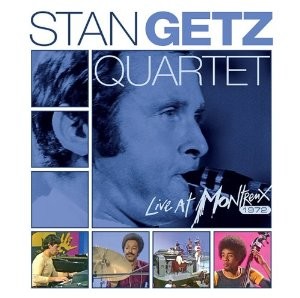 Stan Getz’s audiences must have been a little confused when he rolled out the songs he played at Montreux in July 1972. Most of his program was made up of songs he and his new quartet had recorded that March, for the release that became one of his most popular and critically acclaimed of the late ’60s and early ’70s, Captain Marvel. But for one reason and another, *Captain Marvel was not released until 1974, and it’s entirely possible that his fans were still thinking of the tenor player as the guy behind the phenomenal hit “The Girl From Ipanema” and his ground-breaking album with Charlie Byrd Jazz Samba.
Stan Getz’s audiences must have been a little confused when he rolled out the songs he played at Montreux in July 1972. Most of his program was made up of songs he and his new quartet had recorded that March, for the release that became one of his most popular and critically acclaimed of the late ’60s and early ’70s, Captain Marvel. But for one reason and another, *Captain Marvel was not released until 1974, and it’s entirely possible that his fans were still thinking of the tenor player as the guy behind the phenomenal hit “The Girl From Ipanema” and his ground-breaking album with Charlie Byrd Jazz Samba.
That’s all supposition on my part, and perhaps projection, because that’s how I thought of Getz until I heard Live at Montreux 1972. But when muscular drummer Tony Williams kicks off “Captain Marvel” with four solid thumps on the kick and a double-thwack on the tom to kickstart the band into this driving fusion piece, well, the beaches of Rio are far away. Getz takes the lead on the riff-heavy tune, driven by Williams and Stan Clarke on the stand-up bass, and a very young-looking Chick Corea on electric piano.
This is a superb program. There’s the soul jazz of “Day Waves,” a sweet reading of “Lush Life” and a moving “I Remember Clifford,” the slow build of “Windows” with plenty of swing brought by that rhythm section amidst the fusion trappings, and two long barn-burners to finish the program. Corea’s Latin-tinged “La Fiesta” brings some relieved applause from the crowd that’s ready for some of that south-of-the-border sound, but Getz soars to amazing heights on this one, and his solo passages bring spontaneous cheers from the audience. And the finale “Times Lie” is even more out there, exploring all kinds of musical ideas amidst a driving beat that won’t quit. I get sucked up into it every time, at about the 10 minute mark, when Williams and Corea start tossing little motifs back and forth, Clarke keeps pushing the beat and Getz explores harmonies with Coltrane-like fervency, before it all slowly melts down into a lovely melodic coda.
The fidelity on this set isn’t great – Clarke’s bass sometimes threatens to obliterate all the other players – but it’s no worse than many live jazz recordings of the period. This one also comes as a CD/DVD package, which is worth getting for fans of Getz, Corea, and early fusion. The CD alone, though, is definitely highly recommended.
(Eagle, 2013)
